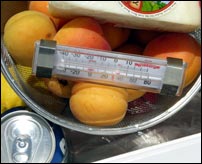|
Cooler
Cuisine: Tips for Fresh and Healthy Road Food,
continued from page 1
Now as a practical
matter, how long can you keep that food in the cooler?
Unless you're watching your cooler like a hawk and are
sure that it is 40 degrees or colder don't try to keep
food as long in the cooler as you do at home in a refrigerator.
Even if it is safe, your lettuce may not be as crisp
and appetizing in the cooler.
The following is a general guideline
for keeping food in a cooler. It assumes that your
cooler is 40 degrees or colder but gives you a margin
for error to accommodate for the kiddies pulling pops
out regularly, the cooler being left in the sun, loads
of warm food placed in the cooler, and other cooler
hazards. If you know your cooler has been above forty
degrees, play it safe and discard potentially hazardous
foods such as meats and egg-based dressings.
- Fish, poultry, and ground meat:
These are both very perishable and potentially hazardous.
Do not keep these foods in a cooler for more than
a day or two-never over two.
- Steaks and chops: These
should keep for three or four days in a cold cooler.
- Cured bacon and lunch meat:
The cured nature of these meats will keep these safe
longer. Use within a week. Be cautious of deli meats
that may not be cured and will not keep as well.
- Eggs: As long as they are
kept cold, your eggs should last one to two weeks.
Discard any eggs that have cracked shells. Remember
that egg shells are porous. Do not let the eggs sit
in water in the bottom of the cooler where they may
become contaminated.
- Milk: Milk may keep for
a week in the refrigerator but do not plan on keeping
milk in the cooler for more than two or three days.
Smell or taste milk before using to make sure that
it is still fresh, especially if you are using it
in cooking where spoiled milk may not be noticed.
- Cheese: If kept in its
original packaging that is air and moisture tight,
cheese will keep a long time-harder cheeses longer
than soft cheeses. Plan on keeping cheeses in a cooler
for a week or longer. We have taken cheeses on backpacking
in the mountains and river trips with no refrigeration
for four or five days.
- Butter and margarine: Margarine
will keep longer than butter. You should get two weeks
or more from your margarine and at least a week from
your butter. Butter will become rancid. It will also
absorb odors from your kitchen. Store your butter
in zipper-type plastic bags. Do not let it become
wet.
- Yogurt, sour cream, and cream
cheese: Plan on using these within a week.
- Ripe fruit: For keeping
qualities, there are three classes of fruit. Berries
and cherries will only keep for one or two days. Soft
fruits-grapes, melons, pears, peaches, plums, and
apricots-should keep for three or four days. Apples
and citrus fruits will keep for a month.
- Fresh vegetables: Broccoli,
peas, summer squash, and lettuce will keep for two
or three days. Carrots, cabbage, cucumbers, green
beans, lettuce and green peppers will keep for a week.
Potatoes, winter squash, and dry onions will keep
for a couple months and do not need to be refrigerated.
Ideal storage for these vegetables is 50 to 55 degrees.
 Dennis
Weaver -- having burnt food from Miami, Florida
to Point Barrow, Alaska -- is RTA's road food expert.
He has logged thousands of hours on the roads, trails,
and waterways of America including many of Alaska's
wilderness rivers and has consistently been elected
the trips' "chief cook and bottle washer."
Dennis is currently general manager at The
Prepared Pantry, a company in Rigby, Idaho,
that produces ready-to-eat meals and baking mixes
packaged in Mylar. Weatherproof, bug-proof, and
critter resistant, they're ideal for both roadtrips
and back woods camping. Dennis may be reached at
dweaver@preparedpantry.com. Dennis
Weaver -- having burnt food from Miami, Florida
to Point Barrow, Alaska -- is RTA's road food expert.
He has logged thousands of hours on the roads, trails,
and waterways of America including many of Alaska's
wilderness rivers and has consistently been elected
the trips' "chief cook and bottle washer."
Dennis is currently general manager at The
Prepared Pantry, a company in Rigby, Idaho,
that produces ready-to-eat meals and baking mixes
packaged in Mylar. Weatherproof, bug-proof, and
critter resistant, they're ideal for both roadtrips
and back woods camping. Dennis may be reached at
dweaver@preparedpantry.com. |
|


 Dennis
Weaver -- having burnt food from Miami, Florida
to Point Barrow, Alaska -- is RTA's road food expert.
He has logged thousands of hours on the roads, trails,
and waterways of America including many of Alaska's
wilderness rivers and has consistently been elected
the trips' "chief cook and bottle washer."
Dennis is currently general manager at
Dennis
Weaver -- having burnt food from Miami, Florida
to Point Barrow, Alaska -- is RTA's road food expert.
He has logged thousands of hours on the roads, trails,
and waterways of America including many of Alaska's
wilderness rivers and has consistently been elected
the trips' "chief cook and bottle washer."
Dennis is currently general manager at